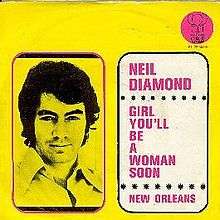Girl, You'll Be a Woman Soon
| "Girl, You'll Be a Woman Soon" | ||||
|---|---|---|---|---|
 | ||||
| Single by Neil Diamond | ||||
| from the album Just for You | ||||
| B-side |
"You'll Forget" (US, UK) "New Orleans" (continental Europe) | |||
| Released | March 25, 1967 | |||
| Format | 7" | |||
| Genre | Pop | |||
| Length | 2:48 | |||
| Label | Bang | |||
| Writer(s) | Neil Diamond | |||
| Producer(s) | Jeff Barry, Ellie Greenwich | |||
| Neil Diamond singles chronology | ||||
| ||||
"Girl, You'll Be a Woman Soon" is a song written by Neil Diamond, whose recording of it on Bang Records reached #10 on the U.S. pop singles chart in 1967. The song enjoyed a second life when it appeared on the 1994 Pulp Fiction soundtrack, performed by rock band Urge Overkill. Other versions have been recorded by Cliff Richard (1968), Jackie Edwards (1968),[1] Gary Puckett and the Union Gap (1969), the Biddu Orchestra (1978), and 16 Volt (1998).
Neil Diamond version
The song first appeared on Diamond's album Just for You. The mono and stereo versions of this song differ slightly. On the mono "Just For You" LP as well as on the 45, the strings do not come in until the second verse. It also has a slightly longer fade. The stereo "Just For You" LP version has a shorter fade and the strings come in on the first chorus.
Track listings
- 7" single
- "Girl, You'll Be a Woman Soon"
- "You'll Forget"
Charts
| Chart (1967) | Peak position |
|---|---|
| U.S. Billboard Pop Singles[2] | 10 |
| Chart (1971) | Peak position |
| Dutch Mega Top 100[3] | 27 |
Cliff Richard version
| "Girl, You'll Be a Woman Soon" | ||||
|---|---|---|---|---|
| Single by Cliff Richard | ||||
| A-side | "I'll Love You Forever Today" | |||
| Released | June 21, 1968 | |||
| Format | 7" | |||
| Genre | Pop | |||
| Length | 3:04 | |||
| Label | Columbia | |||
| Writer(s) | Neil Diamond | |||
| Producer(s) | Norrie Paramor | |||
| Cliff Richard singles chronology | ||||
| ||||
Cliff Richard covered the song as the B-side to his 1968 single I'll Love You Forever Today, which featured in the movie Two a Penny.[4]
Track listings
- 7" single
- "I'll Love You Forever Today" – 3:06
- "Girl, You'll Be a Woman Soon" – 3:04
Charts
| Chart (1968) | Peak position |
|---|---|
| UK Singles Chart | 27[5] |
Urge Overkill version
| "Girl, You'll Be a Woman Soon" | ||||
|---|---|---|---|---|
 | ||||
| Single by Urge Overkill | ||||
| from the album Pulp Fiction | ||||
| B-side | "Bustin' Surfboards" | |||
| Released | 1994 | |||
| Format | CD single | |||
| Genre | Alternative rock | |||
| Length | 3:10 | |||
| Label | MCA | |||
| Writer(s) | Neil Diamond | |||
| Urge Overkill singles chronology | ||||
| ||||
The 1992 Urge Overkill EP Stull includes a version of the song that would be featured in Quentin Tarantino's 1994 film Pulp Fiction. Re-issued as a single, this version achieved success in several European countries, peaking at #10 in France.
Track listings
- CD single
- "Girl, You'll Be a Woman Soon" – 3:10
- "Bustin' Surfboards" by The Tornadoes – 2:27
- "Bullwinkle Part II" by The Centurions – 2:18
Charts
| Chart (1994/95) | Peak position |
|---|---|
| Australian ARIA Singles Chart[6] | 21 |
| Austrian Singles Chart[6] | 22 |
| Belgian (Wallonia) Singles Chart[6] | 29 |
| French SNEP Singles Chart[6] | 10 |
| New Zealand RIANZ Singles Chart[6] | 19 |
| UK Singles Chart[7] | 37 |
| U.S. Billboard Hot 100[8] | 59 |
| U.S. Billboard Hot Modern Rock Tracks[8] | 11 |
References
- ↑ "Jackie Edwards - Put Your Tears Away (Vinyl, LP, Album)". Discogs.com. Retrieved 2016-09-30.
- ↑ Billboard allmusic.com (Retrieved March 27, 2009)
- ↑ "Girl, You'll Be a Woman Soon" (original version), in various singles charts Dutchcharts.nl (Retrieved March 28, 2009)
- ↑ Dave Thompson. "Two a Penny - Cliff Richard | Songs, Reviews, Credits". AllMusic. Retrieved 2016-09-30.
- ↑ "Official Singles Chart Top 50 | Official Charts Company". Officialcharts.com. Retrieved 2016-09-30.
- 1 2 3 4 5 "Girl, You'll Be a Woman Soon" (by Urge Overkill), in various singles charts Lescharts.com (Retrieved March 28, 2009)
- ↑ "Girl, You'll Be a Woman Soon" (by Urge Overkill), UK Singles Chart Chartstats.com (Retrieved March 28, 2009)
- 1 2 Billboard allmusic.com (Retrieved March 28, 2009)